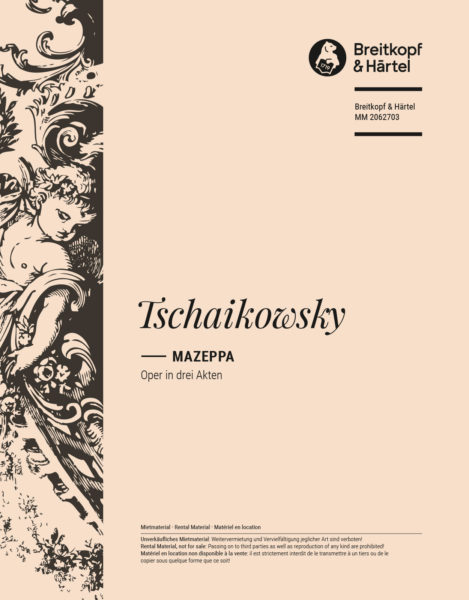Pjotr Iljitsch Tschaikowsky (1840–1893) Mazeppa
Oper in 3 Akten Dauer: 180'
Persönliche Betroffenheit war bei der Entstehung im Spiel, als Tschaikowsky 1881 auf Puschkins Gedicht „Poltava“ zurückgriff und dem Operntext zugrunde legte.
Libretto: Pjotr Iljitsch Tschaikowsky nach Alexander Puschkins Gedicht „Poltava“
unter Verwendung eines Textbuchs von V. P. Burenin
Ort und Zeit: Ukraine, Anfang des 18. Jahrhunderts
Personen: MAZEPA (Bariton) – KOCUBEJ (Bass) – LJUBOV KOCUBEJ (Mezzosopran) – MARIJA (Sopran) – ANDREJ (Tenor) – ORLIK (Bass) – ISKRA (Tenor) – BETRUNKENER KOSAK (Tenor)
Chor: SSAATTBB (Kosaken, Gäste, Kocubejs Diener, Soldaten, Mönche und Henker)
Orchester: 3(Picc).2.Eh.2.2. – 4.2.2Corn.3.1. – Pk.Schl(5) – Hfe – Str
Bühnenmusik: Banda außerhalb der Szene (Akt II) und auf der Bühne (Akt III)
Persönliche Betroffenheit war bei der Entstehung im Spiel, als Tschaikowsky 1881 auf Puschkins Gedicht „Poltava“ zurückgriff und dem Operntext zugrunde legte. Tschaikowskys Vorfahren, ukrainische Kosaken, waren 1709 in der Schlacht bei Poltawa umgekommen. Verständlicherweise beschäftigte ihn das Schicksal des grausamen ukrainischen Heerführers Mazeppa und seine tragische Liebe zu der wesentlich jüngeren Marija noch lange nach der Aufführung, die 1884 am Bolschoi-Theater in Moskau stattfand. Dennoch ist es unangebracht, von einer Fassungsproblematik zu sprechen. Es gibt eine aufführbare „Fassung letzter Hand“, und „Mazeppa“ wird nicht lange ein Geheimtipp unter Kennern bleiben.
Zum Trailer der Komischen Oper Berlin auf YouTube
| Einleitung |
| Akt 1: Mädchenchor und Szene - Szene, Arioso und Duett - Szene - Chor und Tanz - Hopak - Szene und Arioso - Streitszene - Chor und Mutters Klagelied - Finale |
| Akt 2: Gefängnisszene - Mazeppas Monolog und Szene mit Orlik - Mazeppas Arioso - Mazeppas Szene mit Maria - Szene zwischen Maria und ihrer Mutter - Massenszene - Finale |
| Akt 3: Die Schlacht bei Poltawa - Szene und Andrejs Aria - Szene und Duett - Auftritt der wahnsinnig gewordenen Maria - Finale |









